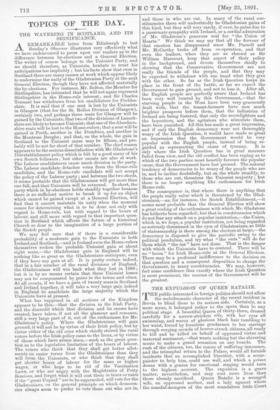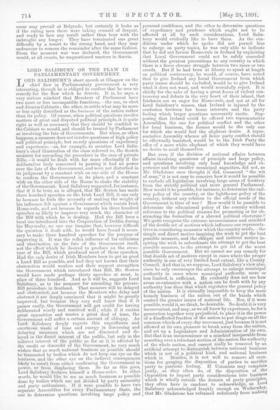THE EXPULSION OF QUEEN NATALIE. T HE public interested in foreign
politics should not allow the melodramatic character of the recent incident in Servia to blind them to its serious side. Certainly, as a. mere scene, it belonged rather to the opera than to any political stage. A beautiful Queen of thirty-three, dressed carefully for a sorrow-stricken rote, with her eyes all swimming, and waves of glorious black hair tumbling to her waist, forced by ferocious gendarmes to her carriage through surging crowds of horror-struck citizens, all ready to kill and be killed on behalf of oppressed virtue and maternal sentiment,—that wants nothing but the shivering music to make a grand sensation on any boards. The rush of the citizens, too, the rescue of suffering innocence, and the triumphal return to the Palace, would all furnish incidents that an accomplished librettist, with a scene- painter to help him, could use well, and which a prima donna with a genius for emotional singing would turn to the highest account. The expulsion is a grave matter, nevertheless, and may cost more lives than those already sacrificed. Queen Natalie is a wronged wife, an oppressed mother, and a lady against whom the scandal-mongers of the most scandalous little Court in Europe have never breathed a word; but she is also a Slav woman, full of ambitions, loving dignity, and with the kind of determination which you see in the Nihilists, a power of shutting down the will till it cannot be unlocked again, She has, as we have never doubted, and as the incidents of her arrest have proved, been making a party for herself in Belgrade, of which the Radical Government of Servia at length grew afraid. If she succeeded wholly and won over the troops, she might upset them all, and become Queen Regent, with her son, the i nominal King, completely in her hands ; while if she partly succeeded, and became a ruling influence, her hus- band, Sing Milan, would infallibly appear on the scene, and as the favourite of the Army, might abolish the Con- stitution as unworkable, and resume power. He is not an ad- mirable person, judged by any code whatever ; but he is the ablest of living Servians, he is the heir of the liberator of the country, and Eastern Europe has a large tolerance for unbridled whim. The Radical Government decided, therefore, probably on just the same arguments as in- fluenced the French Chamber to expel the Orleans Princes, that Queen Natalie must go. She might be dangerous even abroad, but at least Belgrade and the leading soldiers would no longer feel the charm of her personality. They told her so at intervals for months, never eliciting any reply except that " her Majesty was within her legal and natural rights, and would yield them only to force ;" and at last, pressed on all sides, by King Milan, by their own party leaders, and by their own fears, they decided to employ the force which the lady challenged. According to English ideas, they had not a particle of legal authority, for whether the divorce held good or not—and it was un- deniably bad—Queen Natalie was a naturalised Servian, with a complete right to reside in Belgrade so long as she pleased. The Skuptschina, it is true, had expressed a desire that she should be removed; but the resolution was not voted without reluctance, and the pious wish even of a Parliament is not exactly a law. The limits of executive right when public safety is imperilled are, however, hard to draw, and the Government being sure, if it succeeded, of a bill of indemnity, at last made up its mind and acted on its decision, but in acting, blundered outrageously. A coup cratat of that kind should be struck at once, in silence, and with irresistible force,—should be, in fact, the bolt out of the blue to which it is usually compared. The Servian Government, on the contrary, allowed the news of their intention to reach the Queen, who was therefore enabled to warn her friends to be ready, and to arm her household with revolvers. They sent at first only a civil force, and they placed the Queen in full daylight in a carriage which had to traverse the streets in order to reach the railway-station. That was almost to invite a rising, and the moment the situation was perceived, it came. Her partisans, headed by the armed students, beat off the gendarmes, turned the carriage, and carried the rescued Queen back in triumph to the Palace, turning afterwards to attack some cavalry who had advanced to the relief of the police. The cavalry of course dispersed them, but they had to fire to do it ; every horseman was wounded ; and the fruit of the day, if not its honours, rested with the Queen. The Cabinet had, however, gone too far to draw back ; to recede was to leave the Queen mistress in Belgrade ; meeting was held at midnight, and before dawn the Queen was seized, apparently by actual physical force, but possibly only after a forcible breaking down of the Palace doors, and carried to the station, whence she was conveyed to Austrian territory, where official feeling has, except as re- gards the divorce, always been favourable to her husband. Violence of this kind, even if it seems to succeed for a moment, is always attended with one fatal consequence. It compels the civil Government to rely more entirely upon the armed force, which alone protects them from the vengeance of the citizens, and therefore to conciliate the soldiery. These latter are in Servia highly discontented with the Radical Administration ; they will not be soothed by the hatred they have excited in the capital ; and as they can rule the country if they please, it may be necessary, in order to quiet them, to find them an occupation. This can only be war, and war only with Bulgaria, for Servia has not the strength to fight either Russia or Austria, and she has no quarrel, or at least no avowed quarrel, with Roumania. A rumour has there- fore sprung up that the Servian Government intends to in- vade Bulgaria, and there is in it more probability than usual. There are plenty of pretexts, and one or two, connected with legal boundaries, of a rather serious kind. The Servian officers, it is known, long to efface the stain which the defeat of Slivnitza, left, as they think, upon the national reputation. The Servian Government knows that a successful war would solidify its position, and thiuks that, with no Prince Alexander to command the Bulgarians, with aid from Montenegro, and with the good-will at least of St. Petersburg, the war might be successful, and would be, at all events, a war with limited liability. If Russia. means war, she would, if they were defeated, de- fend them ; and if she means peace, she would insist, as the condition of peace, that the terms enforced by the victors should not be unendurable, and should leave Servia much in her old position. That was what happened before, when Prince Alexander was stripped of the whole advantage of his victory ; and it is not unreasonable for Servians to think it would happen again. The calculation is not without astuteness, the Servians have been arming for months, and nothing would be less surprising than a challenge to Sofia in the shape of an armed rush, which must, of course, be unhesitatingly accepted. It is possible, of course, that the Government of Servia may hesitate, or that either Austria or Russia may peremptorily forbid the contest; but there is no par- ticular reason for accepting that optimist opinion. The Government of Servia are probably right, from their point of view, in thinking that nothing but victory can release them from their endless troubles, and restore to authority the prestige sacrificed by King Milan's abdication, and the muddle which has prevailed in Bel- grade ever since. Defeat would no doubt overthrow them ; but then, they probably expect to be overthrown without defeat, and in either case the consequence of overthrow is exile. As to Austria, she is slow to take great resolutions, and may well hesitate, by occupying Servia, to challenge Russia to a combat single-handed. Germany is in no way bound to interfere in such a struggle for the Balkans, and would have enough to do in warily watching France, and preparing to intervene if her ally should be pressed to a dangerous extent, an extent, that is, which would make a compact with St. Petersburg seem to the Hapsburgs the easiest road out. Russia, of course, could forbid the duel, but why should she ? While Austria remains quiet, the struggle must be all to her advantage ; for if Servia is defeated, she can earn gratitude by " saving " Servia ; while if Bulgaria is defeated, that is precisely what her ingratitude in rejecting Russian dictatorship deserves. To sit quiet, and yet see M. Stambouloff humbled, Prince Ferdinand driven from his throne, and Bulgaria rendered insolvent, would be a luxurious position for the Czar, who honestly looks on the Bulgarians as Slays whom his father saved from the Turk, and who have ever since behaved as ill-conditioned rebels. The situa- tion, we should say, has more chance of war in it than any which has arisen for some years. It is not, of course, in any way certain that a war in the Balkans, if it broke out, must involve the greater Powers. They could keep a ring if they pleased, and they would have just as many reasons for keeping it as they have for keeping the peace now. Russia and Austria are not bound to fight because Servians and Bulgarians are killing each other, and no other Great Power could, if it tried, bring its troops into action on such a distant scene. The war, however, would greatly excite Slav feeling, and might, if Bulgaria seemed victorious, rouse a tempest in the Russian Army to which the Czar must either yield, or be prepared for dangerous discontent. The Russians hate the Austrians, and to see the Bulgarian side, which is the Austrian side, prevail, would be almost unendurable to Pan-Slavists, with whom no Czar ever breaks, and to whom the present Czar has repeatedly shown his sympathy. It is always best to separate Ministers from Sovereigns, because that allows to the latter the opportunity of retreat ; but no Minister in St. Petersburg would have ventured, unless sure of sanction, to condone the kidnapping of Prince Alexander. On the other hand, the Bulgarians could hardly be defeated without Turks taking the field, and the moment Turkey is in movement, religious forces begin to work with a strength which has often paralysed the strongest resolutions of statesmen. It is possible for the Powers to stand neutral, for they were neutral in the previous war ; but it Inust be immensely difficult, and may at any moment become impossible. Let us hope that sense may prevail at Belgrade, but certainly it looks as if the ruling men there were taking counsel of despair, and ready to face any result rather than bear with the imbroglio any longer. They have terminated one great difficulty by a resort to the strong band, and they may endeavour to remove the remainder after the same fashion. From the moment war was declared, the Government would, at all events, be unquestioned masters in Servia,




































 Previous page
Previous page